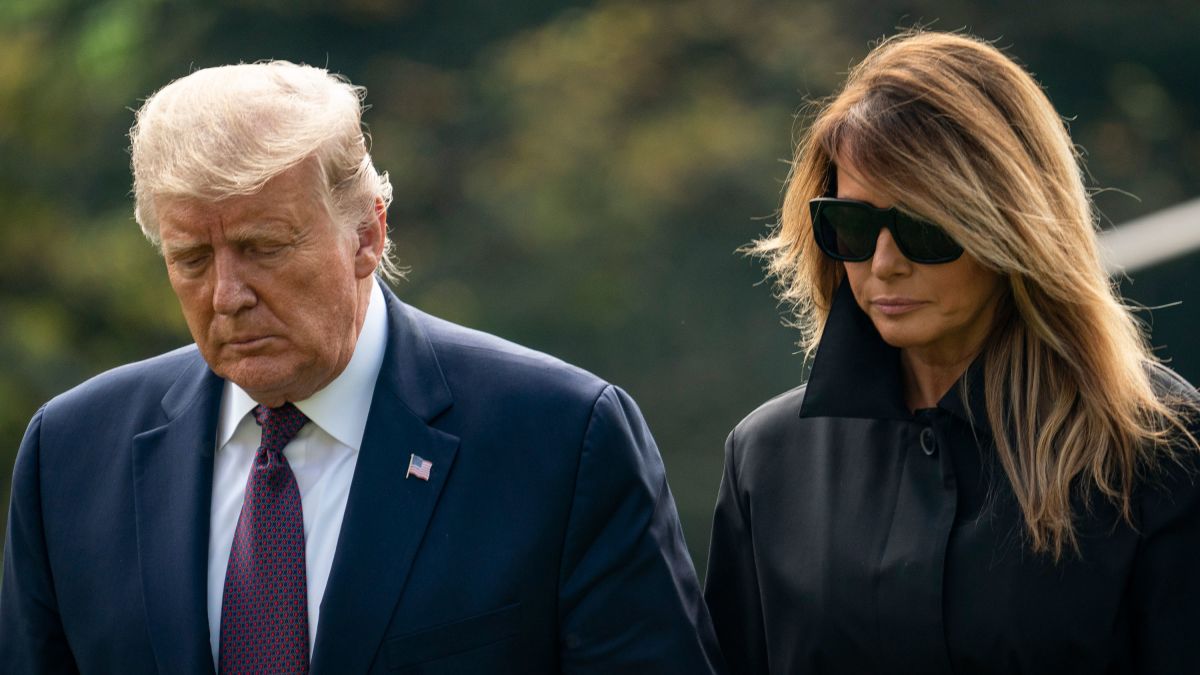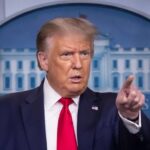US president Donald Trump and his wife Melania have tested positive for coronavirus.
Trump announced their status in a tweet Thursday night.
- Coronavirus: Trump asks U.S. pharmaceutical coys to accelerate work on vaccine
- COVID-19: Trump calls Buhari, promises to give Nigeria ventilators
“We will begin quarantine and recovery process immediately,” he said.
“We will get through this together.”
Tonight, @FLOTUS and I tested positive for COVID-19. We will begin our quarantine and recovery process immediately. We will get through this TOGETHER!
— Donald J. Trump (@realDonaldTrump) October 2, 2020
“The president and first lady are both well at this time, and they plan to remain at home within the White House during their convalescence,” the president’s physician, Sean P. Conley, said in a statement without saying how long that would be.
“Rest assured I expect the president to continue carrying out his duties without disruption while recovering, and I will keep you updated on any future developments.”
No word on symptoms
Other aides to the president would not say whether he was experiencing symptoms, but people at the White House noticed that his voice sounded raspy on Thursday, although it was not clear that it was abnormal for him, especially given the number of campaign rallies he has been holding lately, according to New York Times.
Trump received the test result after one of his closest advisers, Hope Hicks, became infected, bringing the virus into his inner circle and underscoring the difficulty of containing it even with the resources of a president.
Trump has for months played down the severity of the virus and told a political dinner just Thursday night that “the end of the pandemic is in sight.”
Between COVID-19 and election campaign
Trump’s positive test result could pose immediate difficulties for the future of his campaign against former Vice President Joseph R. Biden Jr., his Democratic challenger, with just 33 days before the election on Nov. 3.
Even if Trump, 74, remains asymptomatic, he will have to withdraw from the campaign trail and stay isolated in the White House for an unknown period of time.
If he becomes sick, it could raise questions about whether he should remain on the ballot at all.
Even if he does not become seriously ill, the positive test could prove devastating to his political fortunes given his months of diminishing the seriousness of the pandemic even as the virus was still ravaging the country and killing about 1,000 more Americans every day.
He has repeatedly predicted the virus “is going to disappear,” asserted that it was under control and insisted that the country was “rounding the corner” to the end of the crisis.
He has scorned scientists, saying they were mistaken on the severity of the situation.
Trump has refused for months to wear a mask in public on all but a few occasions and repeatedly questioned their effectiveness while mocking Mr. Biden for wearing one.
Trailing in the polls, the president in recent weeks increasingly held crowded campaign events in defiance of public health guidelines and sometimes state and local governments.
When he accepted the nomination on the final day of the Republican National Convention, he invited more than 1,000 supporters to the South Lawn of the White House and has held multiple rallies around the country since, often with hundreds and even thousands of people jammed into tight spaces, many if not most without masks.
A positive test will undercut his effort to change the subject away from a pandemic that polls show most Americans believe he has mishandled and onto political terrain he considers more favorable.
Trump has sought to focus voter attention instead on violence in cities, his Supreme Court nomination, mail-in ballots and Biden’s relationship with liberals.
What an infected president means
Aside from the campaign, the symbolism of an infected president could rattle governors and business owners trying to assess when and how to reopen or keep open shops, schools, parks, beaches, restaurants, factories and other workplaces.
Eager to restore a semblance of normal life before the election, Trump has dismissed health concerns to demand that schools reopen, college football resume play and businesses resume full operation.
In his eighth decade of life, Trump belongs to the age category deemed most vulnerable to the virus. Eight out of every 10 deaths attributed to it in the United States have been among those 65 and older.
Trump has been resistant to permitting details of his health to be made public, raising questions about his overall condition.
He made an unannounced trip in November to Walter Reed National Military Medical Center that prompted speculation that he had an undisclosed medical ailment, but the White House insisted that he simply underwent routine tests, without revealing what they were or what they showed.

 Join Daily Trust WhatsApp Community For Quick Access To News and Happenings Around You.
Join Daily Trust WhatsApp Community For Quick Access To News and Happenings Around You.


